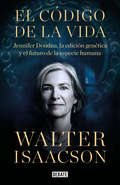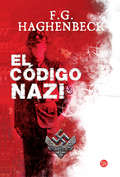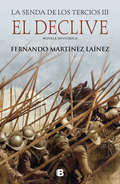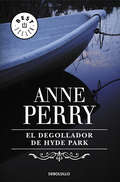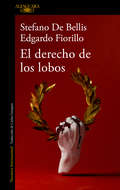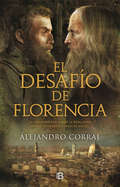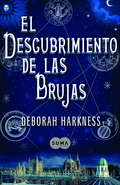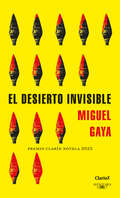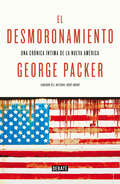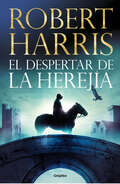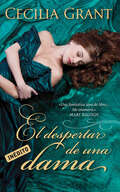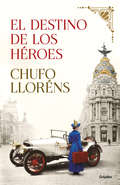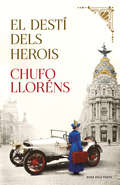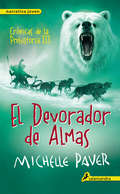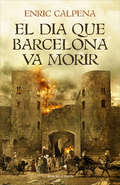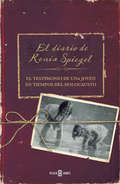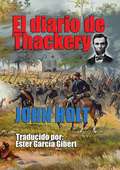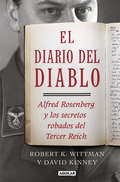- Table View
- List View
El código de la vida: Jennifer Doudna, la edición genética y el futuro de la especie humana
by Walter IsaacsonWalter Isaacson vuelve a fascinarnos, esta vez con la historia de Jennifer Doudna, Premio Nobel de Química 2020, y el avance científico más importante del último siglo. Hay una revolución en marcha, una tecnología prodigiosa que nos va a permitir curar enfermedades, derrotar virus y tener hijos más sanos. A su cabeza está la reciente premio Nobel Jennifer Doudna y sus colegas, protagonistas del nuevo libro de Walter Isaacson. Aunque su profesor de instituto le advirtió que las niñas no podían ser científicas, su búsqueda apasionada de los mecanismos ocultos de la vida y su voluntad por convertir descubrimientos en inventos llevaron a Jennifer Doudna a participar en el avance más importante en el ámbito de la biología desde el descubrimiento de la doble hélice del ADN. Con su equipo, transformó una curiosidad de la naturaleza en una herramienta que cambiará el rumbo del ser humano. El CRISPR, una técnica fácil de usar que permite modificar el ADN, lo que abre un mundo nuevo de milagros médicos pero también de cuestiones morales. El desarrollo del CRISPR (y la carrera por encontrar la vacuna del coronavirus) acelerarán nuestra transición a la siguiente gran revolución. Los últimos cincuenta años han sido una era digital basada en el microchip, el ordenador e internet. Ahora comienza la revolución de las ciencias de la vida. A los estudiantes de código digital se les unirán los que estudian el código genético. ¿Deberíamos usar nuestras nuevas capacidades para hacernos menos vulnerables a los virus? ¿Y para prevenir la depresión? ¿Deberíamos aceptar que las familias que se lo puedan permitir mejoren la constitución física o la inteligencia de sus hijos? Tras dirigir el equipo que descubrió la tecnología CRISPR, Doudna ha liderado los debates en torno a estas cuestiones morales. Obtuvo, junto con su colaboradora Emmanuelle Charpentier, el Premio Nobel de Química en 2020. Su historia es una apasionante aventura que atraviesa las maravillas más profundas de la naturaleza, de los orígenes de la vida al futuro de nuestra especie. La crítica ha dicho...«El premio de este año tiene que ver con la idea de reescribir el código de la vida. Estas tijeras genéticas han llevado a la ciencia a una nueva era.»Anuncio del Premio Nobel de Química 2020 «Un libro extraordinario que profundiza en una de las tecnologías biológicas más innovadoras de nuestro tiempo y las personas que la crearon. Brillante es una lectura absolutamente necesaria para nuestra era.»Siddhartha Mukherjee «Un libro vital sobre la última gran innovación científica, y otra biografía de primer nivel de Isaacson.»Kirkus Weekly
El código nazi
by F. G. HaghenbeckTercera novela del escritor Francisco G. Haghenbeck, El código nazi sondea en las entrañas de la ambigüedad que rigió la política y la opinión pública mexicanas durante la Segunda Guerra Mundial. Este thriller ambientado en México amplifica y pone en manos del lector, con un estilo directo y dotado de un excelente sentido del humor, a pesar del tema que trata, un escenario mexicano dominado por la intriga palaciega y la complicidad, tomando como base un dato histórico del que poco se ha hablado y escrito en nuestro país: los campos de detención de alemanes y japoneses. El código nazi es una historia de espionaje situada en México de los años 40 en medio de campos de concentración y espías nazis infiltrados en los gobiernos de Manual Ávila Camacho y Miguel Alemán, donde el agente, Lorenzo Blanquet, es contratado por un judío exiliado alemán para que asesine al hombre que lo delató al régimen de Hitler, un extraño personaje que ha naufragado en la costas de Veracruz con un extraño cofre.La historia está basada en hechos reales ocurridos durante la Segunda Guerra Mundial, tiempo en que japoneses, alemanes e italianos buscaron refugio. Todos los personajes de la novela existieron; la excepción son los tres principales que utilizó como pretexto para desarrollar la historia en la que devela las partes oscuras y ocultadas por la historia oficial. Tercera novela del escritor Francisco G. Haghenbeck, El código nazi sondea en las entrañas de la ambigüedad que rigió la política y la opinión pública mexicanas durante la Segunda Guerra Mundial. Este thriller ambientado en México amplifica y pone en manos del lector, con un estilo directo y dotado de un excelente sentido del humor, a pesar del tema que trata, un escenario mexicano dominado por la intriga palaciega y la complicidad, tomando como base un dato histórico del que poco se ha hablado y escrito en nuestro país: los campos de detención de alemanes y japoneses. El código nazi es una historia de espionaje situada en México de los años 40 en medio de campos de concentración y espías nazis infiltrados en los gobiernos de Manual Ávila Camacho y Miguel Alemán, donde el agente, Lorenzo Blanquet, es contratado por un judío exiliado alemán para que asesine al hombre que lo delató al régimen de Hitler, un extraño personaje que ha naufragado en la costas de Veracruz con un extraño cofre.La historia está basada en hechos reales ocurridos durante la Segunda Guerra Mundial, tiempo en que japoneses, alemanes e italianos buscaron refugio. Todos los personajes de la novela existieron; la excepción son los tres principales que utilizó como pretexto para desarrollar la historia en la que devela las partes oscuras y ocultadas por la historia oficial.
El declive (La senda de los Tercios #Volumen 3)
by Fernando Martínez LaínezEl apasionante cierre de la trilogía narra la épica batalla que marca el ocaso de la supremacía militar de Los Tercios de Flandes. Las fronteras del imperio español se tambalean ante unos enemigos cada día más fuertes y organizados. Con el propósito de aliviar la presión del ejército francés sobre Cataluña, los tercios de Flandes, con Francisco de Melo al frente, invaden el norte de Francia y sitiían la ciudad de Rocroi. En una batalla que parece ganada de antemano, los españoles se ven rodeados por las tropas de un joven Luis de Borbón. Por primera vez, los tercios se enfrentan a una posible derrota, pero eso no será suficiente para que ningún soldado deje de luchar con la valentía y heroicidad por la que se convirtieron en leyenda. Esta novela recrea de forma magistral la fuerza y el carácter de los tercios de Flandes y culmina una trilogía en la que queda reflejado cómo se convirtieron en Historia.
El degollador de Hyde Park
by Anne PerryUna serie de sanguinarias decapitaciones ocurridas en Hyde Park provocan el pánico en la sociedad londinense. El recuerdo de las macabras hazañas de Jack el Destripador todavía está muy fresco en la memoria colectiva. Naturalmente, el espinoso caso recae en el recién ascendido superintendente Pitt, y si no lo resuelve en un breve plazo es más que probable que eso le cueste también a él la cabeza, profesionalmente hablando, pero ni siquiera las sutiles pesquisas de su esposa Charlotte arrojan luz sobre los siniestros sucesos, ¿Conseguirá Pitt disipar las brumas del Londres victoriano para ver la luz en uno de sus casos más difíciles y electrizantes?.
El degollador de Hyde Park (Inspector Thomas Pitt #Volumen 14)
by Anne PerryEl inspector Pitt debe hacerse cargo de una serie de atroces asesinatos en Hyde Park, cuando el recuerdo de los macabros crímenes de Jack el Destripador todavía está muy fresco en la memoria colectiva de los londinenses. Decimocuarta novela de la serie del inspector Pitt Una serie de sanguinarias decapitaciones en Hyde Park desatan el pánico en la sociedad londinense. Naturalmente, el espinoso caso recae en el recién ascendido inspector Pitt, y si no lo resuelve en un breve plazo es más que probable que eso le cueste también a él la cabeza, profesionalmente hablando. Pero ni siquiera las sutiles pesquisas de su esposa Charlotte arrojan luz sobre los siniestros sucesos. ¿Conseguirá Pitt disipar las brumas del Londres victoriano para ver la luz en uno de sus casos más difíciles y electrizantes? La crítica ha dicho... «Chalotte y Thomas siguen siendo dos de los protagonistas más vívidamente concebidos de la historia de las novelas de misterio con trasfondo histórico.» Booklist
El delicado umbral de la tempestad
by Jorge CastelliPrincipios del año 1807. Segunda Invasión Inglesa a las colonias españolas del Plata. Montevideo ha sido capturada por el ejército británico y es ya una plaza asegurada dentro del imperio del Rey Jorge III. Objetivo próximo: la ciudad de Buenos Aires. Casi diez mil hombres, con sus mejores pertrechos y las armas más modernas, cruzan el gran río a bordo de una flota colosal, para intentar batir la capital del virreinato. Son tropas avezadas, poseedoras de muchísima experiencia en combate, que deberán enfrentarse con regimientos bisoños y con civiles mal equipados. Sin embargo, después del primer día de batalla y luego de haber sufrido grandes pérdidas, el jefe de la expedición, teniente general John Whitelocke, decide capitular. ¿Por qué se rinden los ingleses, más allá de la heroica resistencia hallada a su paso, cuando tenían ya en su poder algunos puntos neurálgicos de la ciudad, la mitad del ejército intacto y la suerte de la batalla aún no del todo comprometida? ¿Por qué causa no es cañoneada Buenos Aires desde el río o desde la tierra? ¿Por qué el general en jefe resuelve abandonarlo todo, incluso la ciudad de Montevideo, que parecía fuera de cualquier discusión? El germen de la política desarrollada por Gran Bretaña sobre el Río de la Plata durante el siglo XIX y buena parte del XX, el honor, el amor, la guerra, la duda, el sentido último de la obediencia militar, son algunos de los temas que aborda Jorge Castelli en esta obra, merecedora cabal del Premio La Nación de Novela (2000). El delicado umbral de la tempestad resulta una novela apasionante por muchos motivos: por la historia que cuenta y por la forma en que lo hace, por haber elegido narrarla desde la óptica de un general inglés denostado -con o sin fundamento- por sus propios pares, por atreverse a plantear desde la ficción hipótesis ajenas al discurso oficial de los historiadores y no por ello menos válidas, por mantener al lector en vilo de la primera a la última página y por instalar en él esa irreproducible sensación de felicidad que sólo provee la buena literatura.
El derecho de los lobos
by Stefano De Bellis Edgardo FiorilloUn gran thriller en la antigua Roma con Cicerón, el excenturión Tito y Sila como protagonistas. «Impresionante como un noir de Ellroy, gore como una película de Tarantino y afilado como un thriller de Turow.» Corriere della Sera «Un thriller sorprendente que recuerda a El nombre de la rosa.»Annachiara Sacchi, La Lettura En el año 80 a. C. Roma es una metrópolis violenta en la que se entrelazan el dinero, el vicio y la política. En la oscuridad de los bajos fondos, cuatro asesinos liderados por un coloso con horribles cicatrices irrumpen en el nuevo burdel de lujo La Vaina del Gladio y provocan unamasacre; entre los muertos, el rico comerciante de telas Marco Vilio Cincio, aspirante a senador. El dueño del lugar, único superviviente de la carnicería y principal sospechoso, ha desaparecido, y son muchos los que lo buscan, como el veterano centurión Tito Anio. En otro rincón de la ciudad, la vestal Cecilia Metela acude al joven Cicerón para que defienda a su protegido, Sexto Roscio, de la acusación de parricidio: una causa delicada que oculta intereses perversos. La sombra de Sila, cuyos enemigos están cada vez más inquietos, se cierne sobre ambos casos. Mientras que, para llegar a la verdad, Tito deberá enfrentarse a peleas, emboscadas y complicaciones sentimentales, Cicerón descubrirá que en el foro está en juego no solo el destino de Sexto, sino el suyo propio, e incluso la supervivencia de la República. La crítica ha dicho...«Un libro impresionante como un noir de Ellroy, gore como una película de Tarantino y afilado como un thriller de Turow.»Corriere della Sera «Mantiene enganchado hasta la última página. [...] Una Roma tentacular, feroz y seductora, un hervidero de intrigas al estilo de L.A. Confidential.»Giuliano Aluffi, Il Venerdì di Repubblica «El noir de la antigua Roma: sexo, delitos y Cicerón.»La Lettura «A medio camino entre la novela de espías y la novela histórica, [...] este apasionante debut supone una grata sorpresa.»Amanda Colombo, LegnanoNews «Roma remota y criminal. [...] El derecho de los lobos une el thriller ciceroniano y el hard boiled de burdel [...] y demuestra que aquí todo es eterno: la política, la equidad y las injusticias.»Federico Condello, Robinson de La Repubblica «Cicerón se convierte en el nuevo Sherlock Holmes.»Cristina De Stefano, Elle «Un intricado fresco de un momento crucial de la historia de Roma, la del poder y caída de Sila. Intriga, sangre y ambigüedad propias de una novela criminal ante litteram.»Paolo Marcolin, Il Piccolo «Una novela repleta de suspense que nos proyecta hacia un mundo lejano de la mano de unos personajes que parecemos conocer de toda la vida. [...] Una novela apasionante.»Mauro Castelli, Economia Italiana
El desafío de Florencia
by Alejandro CorralLa gran novela sobre la rivalidad entre Leonardo da Vinci y Miguel Ángel Buonarroti. Dos genios enfrentados. A comienzos del siglo XVI Leonardo da Vinci y Miguel Ángel Buonarroti coinciden por algún tiempo en la ciudad de Florencia, donde el primero está retratando a Mona Lisa del Giocondo y el segundo planea dar un golpe de efecto formidable. Sumidos en unas relaciones personales tumultuosas, compiten por obtener la concesión de un enorme bloque de mármol en el que solo Miguel Ángel ve su David. El mayor duelo artístico de la Historia del Arte. La rivalidad de los dos artistas alcanza su cénit cuando la Señoría de Florencia decide encargar a ambos la pintura de sendos murales, uno frente a otro, en el salón más emblemático del palacio Vecchio. Una ciudad que era un mundo. Los dos genios del Renacimiento se enfrentan así en un reto colosal orquestado por el inteligente Maquiavelo. Un combate entre dos almas opuestas, deslumbrantes y atormentadas, que libraron la más prodigiosa de las batallas: la que llevaría a uno de ellos a ganarse el favor absoluto de la Florencia que había sido gobernada por los poderosos Médici.
El descubrimiento de las brujas (El descubrimiento de las brujas #Volumen 1)
by Deborah HarknessUn manuscrito embrujado, una historia de amor prohibida, una protagonista que reniega de sus orígenes...Primera entrega de la trilogía «El descubrimiento de las brujas». En el corazón de la Biblioteca Bodleiana de Oxford, la apasionada historiadora Diana Bishop se topa en medio de sus investigaciones con el manuscrito identificado como Ashmole 782. Descendiente de un antiguo linaje de brujas, Diana intuye que el manuscrito está relacionado de alguna manera con la magia, pero no quiere tener nada que ver con la brujería. Y después de tomar algunas notas sobre sus curiosos dibujos, lo devuelve sin perder más tiempo a las estanterías. Lo que Diana no sabe es que se trata de un manuscrito alquímico que ha estado perdido durante siglos y cuyo descubrimiento ha desencadenado que hordas de daimones, vampiros y brujas salgan a la luz de las salas de lectura de la Biblioteca. Una de esas criaturas es Matthew Clairmont, un enigmático genetista, amante del buen vino y vampiro milenario, cuya alianza con Diana se hará progresivamente más íntima y poco a poco surgirá entre ambos una relación que hará tambalear los tabúes asentados desde hace tiempo en un mundo secreto y encantado. La teoría de la evolución de Darwin no contempló todos los seres que habitan la Tierra, pero Deborah Harkness lo ha hecho en esta emocionante e ingeniosa novela. Desde Oxford a Nueva York, y de aquí a Francia, la magia, la alquimia y la ciencia nos desvelan sus verdaderos vínculos en el libro definitivo sobre la brujería y sus poderes. Reseña:«Una original fantasía con toda la magia de Harry Potter o Crepúsculo... Un irresistible cuento de brujería, ciencia y amor prohibido.»People
El deseo de una flor (Amor amor #Volumen 4)
by Mile BluettÚltima entrega de la serie «Amor amor». Cuatro historias que cautivan y enamoran a los lectores. Un romance de época lleno de pasión y deseo. Jørgen Johansen es un rico burgués que jamás conoció sus orígenes. Su único punto de referencia es su tutor, quien se empeñó en hacerlo un hombre de bien. No sabe por qué el duque de San Sebastián, su mejor amigo, ha dejado en sus manos a su candorosa hermana con la insana premisa de que la haga feliz. Menos entiende por qué tan dulce señorita se volvió un incordio cuando terminó en sus manos. Margarita Morell solo anhelaba casarse por amor. Su sueño se rompió en pedazos cuando su poderoso hermano se entrometió en su vida para intentar componerla. Ahora ha quedado supeditada a un hombre frío, hermético y oscuro, pero tan atrayente que se ha convertido en su pretensión más contradictoria. Londres, Madrid y tierras escandinavas del siglo XIX serán los escenarios principales de este romance de época, donde el deseo reprimido luchará por liberarse. Nota: todos los libros de esta serie son autoconclusivos y se pueden leer de manera independiente.
El desierto invisible: Premio Clarín Novela 2022
by Miguel GayaUna historia de la conquista del desierto en la que todo puede haber sido de otra manera. El indio manco del guante de hierro, el coronel y su señora, el cautivo blanco, la mujer que acuna la cabeza del marido degollado, el gobernador omnipresente en el que se vislumbra a Rosas son los personajes sin nombre que pueblan esta ficción que se remonta a uno de los territorios y momentos más polémicos de la historia argentina: la turbulenta frontera con el indio durante el siglo XIX. Novela de imaginación histórica, magistralmente escrita, con personajes inolvidables y un humor a toda prueba, El desierto invisible viaja al pasado para iluminar modos de vida alejados de la versión civilizadora que nos separa en dos mundos antagónicos y sin conciliación posible. La crítica dijo... «Una novela de alta calidad literaria. [...] Dejando de lado cualquier convención trillada, el autor hace de cada uno de estos personajes un ser humano pleno, creíble, tan equivocado y confuso como cualquiera de nosotros.»Ana María Shua «El despojo, la demonización, la marginación de nuestros pueblos originarios, todas esas construcciones ideológicas que se siguen justificando según parámetros y prejuicios establecidos en el siglo XIX están vigentes hoy en día; imaginar un pasado diferente, no del que sucedió, sino del que fue fijado en la memoria colectiva por el discurso dominante, es a lo que nos invita a pensar esta novela.»Carlos Gamerro «El desierto invisible es una incursión multiforme, sólida, profunda en uno de los territorios y momentos más polémicos, más conflictivos de la historia argentina: la lucha por su frontera sur. Esta novela tiene la gran virtud de iluminar ese espacio y ese tiempo que miramos poco.»Martín Caparrós
El desmoronamiento: Treinta años de declive americano
by George PackerTreinta años de declive americano: una crónica íntima de la nueva América El desmoronamiento narra los últimos treinta años de la historia de Estados Unidos, la época del declive americano, a través de las vidas de varias personas: Dean Price, hijo de granjeros, que se convierte en un abanderado de la nueva economía en el Sur rural; Tammy Thomas, una obrera del cinturón industrial del país que intenta sobrevivir al colapso de su ciudad; Jeff Connaughton, miembro del círculo político de Washington, que oscila entre el idealismo y el atractivo del dinero, y Peter Thiel, un multimillonario de Silicon Valley que cuestiona la importancia de internet y construye una visión radical del futuro. Packer entrelaza estas historias personales con perfiles biográficos de las grandes figuras públicas de la época, desde Newt Gingrich hasta el rapero Jay-Z, y con collages de titulares de periódico, lemas publicitarios y letras de canciones, que captan la evolución de los acontecimientos y sus corrientes subterráneas. El desmoronamiento es el retrato de una superpotencia a punto de derrumbarse, con élites que ya no son élite, instituciones que ya no funcionan y la gente corriente abandonada a su suerte. La historia narrativa y caleidoscópica de la nueva América es la obra más ambiciosa publicada en mucho tiempo. # Ganador del National Book Award 2013 # Uno de los mejores libros de 2013 según Amazon # Mejor libro de 2013 según NPR - Mejor libro político de 2013 según The Washington Post - Mejor libro DE 2013 según New Republic # Uno de los mejores libros de no ficción de 2013 según Publishers Weekly # Mejor libro de no ficción de 2013 según Kirkus Reviews Reseñas: «Un mirada profunda, iluminadora y en ocasiones aterradora a la complejidad del declive y a la duradera esperanza de una recuperación.» Vanessa Bush, Booklist «El desmoronamiento vibra, con pena, con indignación y con compasión. El talento de Packer es el del mejor Steinbeck. Ha escrito algo cercano a una obra maestra de la no ficción.» Dwight Garner, The New York Times «Packer es uno de los mejores escritores de no ficción norteamericanos, y teje un tapiz inolvidable. En su sensibilidad, El desmoronamiento está más cerca de una novela que de una obra de no ficción. Y eso lo hace mucho más potente.» Edward Luce, The Financial Times «Aunque El desmoronamiento es abiertamente un homenaje a la trilogía USA de Dos Passos, Packer intenta algo mucho más ambicioso y original. El libro, una versión épica de la historia de Estados Unidos entre 1978 y 2012, es una especie de fantasía, un conjunto de variaciones sobre temas sin el apoyo de una estructura. Un libro brillante e innovador que trasciende el periodismo y se convierte en literatura.» Michael Lind, Bookworld «Como ocurre con Orwell, cada frase de George Packer tiene el vigor de la fuerza moral. El desmoronamiento es un libro vehemente y poderoso que todo el mundo debería leer.» David Grann, autor de The Lost City of Z «La de Packer es una voz de una claridad y una compasión excepcionales, en la tradición de los reportajes que convierten lo cotidiano en extraordinario. Cuando nuestros descendientes contemplen las ruinas de este imperio moderno y remuevan los escombros de su cultura, estas voces serán los pequeños tesoros que perduren.» The Independent «El desmoronamiento tiene muchas de las cualidades de una novela. Una obra de periodismo tan lograda que es más íntima y más compleja -y desde luego más ambiciosa- que la mayoría de las obras de ficción. Lo que distingue El desmoronamiento es cuán completos son los retratos de Packer, su intención de mostrar los deseos y las debi
El despertar de la herejía
by Robert HarrisEn una sociedad donde la fe y el dogma han desterrado la razón y la ciencia, un sacerdote investiga la muerte de un vicario rural. Gran Bretaña, año 1468. El sacerdote Christopher Fairfax llega a una aldea remota enviado por el obispo de Exeter para celebrar el funeral del vicario que acababa de fallecer. El difunto, apasionado coleccionista de artefactos de otras épocas, murió accidentalmente mientras excavaba en los alrededores. Fairfaix se aloja en la vicaría y en los aposentos del religioso fallecido descubre una colección de objetos considerados heréticos, y textos de especialistas en el pasado que sugieren una verdad distinta a la doctrina de la Iglesia, que afirma que el hombre fue castigado con las cuatro plagas: epidemias, guerra, hambruna y muerte tras haberse rendido a la ciencia y a la tecnología. Solo la vuelta a la fe en Cristo salvó in extremis a la humanidad. Fairfax descubre que la torre junto a la que murió el vicario guarda numerosos vestigios de la civilización perdida, y todas las pruebas apuntan a que alguien los depositó allí pensando en un futuro donde fuera posible reconstruirla. La lectura de los libros heréticos que ponen en duda el poder omnipotente de Dios y las causas del Apocalipsis, junto con las investigaciones que le sumergen en esa comunidad aislada harán tambalear la fe y las creencias del joven sacerdote. Todas las civilizaciones se creen invulnerables. La Historia nos advierte de que ninguna lo es. Reseñas:«El despertar de la herejía deja al lector con ganas de una sola cosa: más, por favor.»Tom Hanks «Harris es justamente elogiado como el maestro del thriller inteligente [...] Genuinamente emocionante, maravillosamente concebido y totalmente impredecible [...] expone la fragilidad de la civilización moderna.»The Telegraph «Una novela que no solo te hace sonreír ante la brillantez de su autor, sino que provoca un escalofrío de temor por lo real que parece todo.»Financial Times «Harris escribe con una habilidad e ingenio que pocos novelistas pueden igualar. En este caso ha encontrado un punto de vista único para escribir sobre el presente.»The Financial Times «Un thriller que desafía el género [...] El lector se queda con tantas preguntas como respuestas, y la mayoría de esas preguntas están dirigidas a nosotros mismos.»The Guardian «Como todos los libros de Robert Harris, El despertar de la herejía es estimulante y emocionante a partes iguales.»The Daily Express «Harris hace un trabajo magistral jugando con las expectativas de los lectores.»Publishers Weekly «Ciencia ficción deslumbrante y provocativa, de la que H.G. Wells habría estado orgulloso.»Daily Mail «Un thriller brillante, imaginativo.»READER'S DIGEST
El despertar de una dama (Familia Blackshear #Volumen 1)
by Cecilia GrantSúbitamente viuda Martha Russell concibe un escandaloso plan... para concebir. Martha Russell acaba de verse liberada de un matrimonio infeliz y se prepara para abandonar Seaton Park cuando se entera de que su cuñado, el futuro heredero, es un crápula egoísta y depravado. Dispuesta a asegurar su propio futuro y el de los empleados de la propiedad, Martha maquinará un plan tan desesperado como brillante: concebirá una criatura y la hará pasar como legítimo heredero. Para llevarlo a cabo contratará a Theo Mirkwood, su joven y mujeriego vecino. Pero una cosa es tener que quedarse encinta y otra muy diferente disfrutar de la experiencia. ¿Podrá Theo despertar la pasión de Martha? ¿Puede una relación estrictamente de negocios convertirse en algo más?
El destino de los héroes
by Chufo LlorénsLa novela más ambiciosa de Chufo Lloréns. Una saga trepidante y emotiva que nos hace viajar por la Europa convulsa de la Gran Guerra. Una saga familiar inolvidable que recorre las turbulentas primeras décadas del siglo XX a través de unos personajes magistrales que se enfrentan a la guerra, el amor, los celos y la traición. Los albores del siglo XX en Europa traen consigo aires de esperanza e innovación. En medio de ese ambiente vibrante y alentador, el París bohemio y el Madrid castizo ven nacer dos bellas historias de amor. Deambulando por el barrio de Montmartre, Gerhard, un joven alemán que sueña con pintar como los maestros franceses, se enamora perdidamente de Lucie, la decidida hija de su casera. Por otro lado, en las calles señoriales de la capital de España, el aristocrático José Cervera cae rendido a los pies de la exótica Nachita, la hija de un indiano que está de paso por la ciudad. Todos parecen a punto de alcanzar la felicidad, pero el destino, a veces cruel, les depara auténticas sorpresas. Esta grandiosa saga nos cuenta sus vidas y las de sus hijos, afectadas por los conflictos bélicos que asolan la vieja Europa y enfrentan a España y Marruecos en la cruenta guerra del Rif. Azar, traición, pasión y heroísmo tejen este tapiz narrativo veraz y fascinador, escrito con el pulso dramático de uno de los maestros indiscutibles de la novela histórica. Reseñas:De Te daré la tierra:«Un gran espectáculo de amor y vileza, de traición y aventuras, de juego político en tiempos oscuros.»La Vanguardia «No se había escrito una novela tan completa sobre la Barcelona del siglo XI, un siglo tan crucial como decisivo en la emergencia de la Barcelona mercantil y mestiza.»José Enrique Ruiz-Domènec, catedrático de Historia Medieval UAB De Mar de fuego:«Chufo Lloréns sigue triunfando en el género histórico con Mar de Fuego. El lector se sumerge de lleno en las intrigas palaciegas de la época, además de adentrarse en las entrañas de la Barcelona medieval.»Qué leer «Una espléndida y colosal historia que retrata con acierto y sutileza la Barcelona del siglo XI.»La gaceta de los negocios De La ley de los justos:«Descripciones minuciosas, diálogos precisos, una documentación que se disuelve en intriga y unos personajes en tres dimensiones hacen de la lectura una adicción.»La Razón
El destí dels herois
by Chufo LlorénsUna saga familiar inoblidable que recorre les turbulentes primeres dècades del segle XX mitjançant uns personatges magistrals que s'enfronten a la guerra, l'amor, la gelosia i la traïció. Les primeres albors del segle XX a Europa porten aires d'esperança i d'innovació. En aquest ambient vibrant i encoratjador, enmig del París bohemi i del Madrid castís neixen dues belles històries d'amor. Deambulant pel barri de Montmartre, en Gerhard, un jove alemany que somia pintar com els mestres francesos, s'enamora perdudament de la Lucie, l'agosarada filla de la seva mestressa. Per la seva banda, als carrers senyorials de la capital d'Espanya, l'aristòcrata José Cervera cau rendit als peus de l'exòtica Nachita, la filla d'un indià que està de pas a la ciutat. Tots semblen a punt d'assolir la felicitat, però el destí, a vegades cruel, els ofereix autèntiques sorpreses. Aquesta grandiosa saga ens explica la seva vida i la dels seus fills, afectades pels conflictes bèl·lics que assolen la vella Europa i enfronten Espanya i el Marroc en la cruenta guerra del Rif. Atzar, traïció, passió i heroisme teixeixen aquest tapís narratiu veraç i fascinador, escrit amb el pols dramàtic d'un dels mestres indiscutibles de la novel·la històrica. La crítica especialitzada ha dit:D'Et donaré la terra:«Un gran espectacle d'amor i deslleialtat, de traïció i aventures, de joc polític en temps obscurs.»La Vanguardia «Mai no s'havia escrit una novel·la tan completa sobre la Barcelona del segle XI, un segle tan crucial com decisiu per a l'emergència de la Barcelona mercantil i mestissa.»José Enrique Ruiz-Domènec, catedràtic d'Història Medieval de la UAB De Mar de foc:«[Chufo Lloréns] continua triomfant en el gènere històric amb Mar de foc. El lector se submergeix de ple en les intrigues palatines de l'època, a més d'endinsar-se en les entranyes de la Barcelona medieval.»Qué leer «Una història esplèndida i colossal que retrata amb encert i subtilesa la Barcelona del segle XI.»La gaceta de los negocios De La llei dels justos:«Descripcions minucioses, diàlegs precisos, una documentació que es dissol en la intriga i uns personatges en tres dimensions fan d'aquesta lectura una addicció.»La Razón
El devorador de almas: Crónicas de la prehistoria III (Crónicas de la Prehistoria #Volumen 3)
by Michelle PaverTercera entrega de «Crónicas de la prehistoria», una emocionante serie de aventuras prehistóricas que ya cuenta con un numeroso grupo de jóvenes lectores. Los protagonistas deberán recurrir en esta aventura a todo su coraje e ingenio para salvar a su amigo. Torak, Renn y Lobo viven unos días apacibles tras superar las azarosas peripecias de su última aventura. Sin embargo, cuando por fin han logrado reunirse, muy pronto se ven enfrentados a la peor pesadilla imaginable: durante una rutinaria partida de caza, los Devoradores de Almas secuestran a Lobo con malévolos designios. Así, para seguir la pista de su entrañable amigo, Torak tiene que recurrir a su recién descubierto poder de trasladar su espíritu al cuerpo de diversos animales, aunque el uso de este portentoso don tiene terribles consecuencias que pueden costarle muy caras a nuestro joven héroe. Eldesenlace se librará en el lejano y helado Norte, donde nuestros intrépidos protagonistas deberán recurrir a todo su ingenio y coraje en un entorno inhóspito y plagado de peligros indescriptibles. Reseñas:«Una aventura maravillosamente imaginada.»Times Educational Supplement «Soberbio.»The Times
El dia que Barcelona va morir
by Enric CalpenaEl prestigiós divulgador històric Enric Calpena ens explica l'episodi més devastador de la Barcelona del segle X, la ràtzia d'Almansur: el dia que la ciutat va estar a punt de desaparèixer per sempre. Una de les llegendes més fascinants de la nostra història. «L'any del Senyor 985, trigèsim primer del regnat de Lotari, rei dels francs, els exèrcits sarraïns van avançar i van arribar fins a Barcelona. Devastant tota la terra, van prendre la ciutat, la van despoblar i incendiar. Tot el que s'havia guardat en el seu interior es va cremar, i el que va escapar al desastre s'ho van emportar els assaltants.» Tot això va passar el dia que Barcelona va morir... Ipso die quando Barchinona interiit... El visir Almansur avança amb quaranta mil homes, decidit a saquejar la ciutat de Barcelona, la capital del comtat més poderós del sud dels Pirineus. L'experimentat comte Borrell, el jove vescomte Udalard, la seva esposa Riquilda, la sàvia vescomtessa vídua Geriberga, l'intel·ligent ardiaca Arnulf i el criat Gondemarus, entre molts altres, es disposen a defensar la ciutat. Però potser la desgràcia que s'apropa a les muralles és només una prova que l'Anticrist està a punt de desencadenar tota la seva fúria sobre els habitants de Barcelona, com ja ho ha fet a Roma i en altres regnes de la cristiandat.
El diablo enamorado (El corazón de un libertino #Volumen 5)
by Kathia IblisVuelve Kathia Iblis con la quinta entrega de la serie «El corazón de un libertino». Un hombre en busca de la venganza y una joven que es capaz de todo para proteger a su familia. El príncipe Mikhail Vladimir Zubov, mejor conocido como El Diablo, solo anhela hacer sufrir al hombre responsable de la caída de su inocente hermana menor y para lograrlo está dispuesto a llegar tan lejos como sea necesario. Incluso si eso implica secuestrar a una joven y convertirla en su prisionera a lo largo del invierno ruso. Melpómene Forrester Winthrop creyó que Londres seria su nuevo hogar. Un lugar en el cual estaría sana y salva en donde criar a su pequeño hijo. Pero no tardo en descubrir que no sería así cuando alguien la arrebata del lado de su familia, solo para hallarse a merced de un hombre cuyo frío exterior oculta un corazón apasionado. Lo que ninguno esperaba era encontrar a la persona capaz de desafiarlo más allá de sus propios límites y que despertara una pasión abrasadora que bien podría llevarlos a descubrir un amor destinado.
El diablo pelirrojo quiere ser duquesa
by Verónica MengualHay pocas cosas que la pupila del duque de Norfolk no sea capaz de conseguir con tres damas de armas tomar como ejemplo. Una historia completa y picante donde no faltarán tampoco el humor, los celos, la intriga y el amor. Después de que las tres institutrices ocupen su lugar en sociedad, toca conocer el pasado y el futuro de lady Dorothy Cambridge, más conocida como el Diablo pelirrojo. Ha cumplido la mayoría de sus sueños: jugar a las cartas, dominar el ajedrez e incluso el duque la ha enseñado a disparar y a batirse con las espadas. La directora de la Escuela para señoritas Dama Perfecta contribuyó también a su educación dándole un puñal que ella siempre lleva consigo. ¡Qué se lo digan al vizconde Warwick! El caballero que se esconde bajo la brillante armadura es un libertino de primer orden, su fama es legendaria y está hastiado de las mujeres. Ha perdido todo interés en las féminas hasta que cierta pelirroja lo deja maniatado y desnudo en la oscuridad de un jardín. El escándalo estallará y la sentencia habrá de ser cumplida. ¿Se conformará Dorothy con llegar a ser una condesa?
El diablo se lleva al duque
by Sandra SookooÉl la acepta pero no la ama... Donovan James Arthur Sinclair, octavo duque de Manchester, está maldito a vagar por la Tierra como un cambia-lobos. La mayor parte de los días no le importa la bestia, pues la vida de un duque es bastante espléndida, pero resulta agotadora si es sincero consigo mismo. Cuando salva a una señorita del campo de un carruaje fuera de control en un pueblo rural, se le ocurre que podría estar equivocado. Ella lo ama pero no puede aceptar lo que él es en realidad... La señorita Alice Morrowe, es ciega y está firmemente en el estante, no amada y no deseada por casi todos los que ha conocido. Aunque es feliz con su vida, quiere ser aceptada por lo que es. Cuando es arrojada al suelo en una maraña de miembros por un hombre muy desnudo en medio de un estruendo de cascos, no puede evitar preguntarse si su vida está a punto de cambiar. Un matrimonio de conveniencia que es cualquier cosa menos... En ella, Donovan ve una forma de romper su maldición si consigue seducirla hasta el amor. En él, Alice encuentra consuelo y la emoción del romance. Ella está encantada de casarse con él y de conseguir la vida que siempre ha deseado, pero ¿es su amor lo que él necesita para desterrar a la bestia que lleva dentro? Las emociones se disparan cuando las cosas no resultan como cada uno había planeado. Sólo el descubrimiento de la verdad y el amor genuino pueden traer claridad, esperanza... y el "felices para siempre".
El diario de Leonor (Un romance en la colonia #Volumen 3)
by Arlene SabarisUna doncella divertida y un poderoso hacendado para quien las mujeres son una propiedad más. El apasionante final de la trilogía «Un romance en la colonia», una serie que no te puedes perder. Lucía y Leonor son hermanas mellizas, pero lo único que tienen en común es haber compartido el vientre de su madre. Lucía es tímida y disfruta de la soledad, mientras Leonor adora los bailes y los vestidos. Con una hermana mayor de belleza exuberante y temperamento impaciente, las más pequeñas, cada una desde su personalidad, luchan por atención en una sociedad donde las mujeres tienen pocas opciones para crear su propia felicidad. El Vizconde de Salinas y sus frecuentes viajes a La Habana, Cuba, terminarán por dar a sus hijas más libertades de las que él hubiera querido y pronto sus reglas e instrucciones se verán ignoradas por Lucía y Leonor que se rehúsan a la vida que, en especial su madre, ha ideado para ellas. Leonor siempre había sabido divertirse y guardaba cada recuerdo en un diario del que no se separaba jamás. En su natal España ya se había enamorado y el traslado a la colonia, si bien había arruinado el romance, no le impedía ilusionarse con el regreso, así que anotaba todo lo que haría al volver. No obstante, la aventura isleña se había prolongado mucho más que el verano y Leonor empezaba a sospechar que este no era un viaje con regreso. Un socio de su padre había llegado desde La Habana y a pesar de que sabía que era un terrateniente criollo, algo en su forma tosca de hablar despertaba una sensación desconocida en el estómago de la jovencita. Para el poderoso hacendado, Alejandro Ramírez, las mujeres nunca habían sido más que una propiedad y el amor no era parte de su agenda de negocios. La controversia del amor entre un criollo y una española, pondrán de cabeza una colonia completa en esta historia.
El diario de Renia Spiegel: El testimonio de una joven en tiempos del Holocausto
by Renia SpiegelTras permanecer oculto más de setenta años, sale a la luz el diario de una joven judía polaca que relata su adolescencia y sus últimos días durante el Holocausto. Un testimonio de vida profundamente humano, veraz e impactante.Un legado de poesía y amor. Miércoles, 15 de julio de 1942 «Recuerda este día, recuérdalo bien. Se lo contarás a las generaciones que están por venir. Desde las ocho de hoy estamos encerrados en el gueto. Ahora vivo aquí. El mundo está aislado de mí y yo estoy aislada del mundo.» Renia Spiegel tiene quince años y es una adolescente como muchas otras. Le gusta escribir poesía, reunirse con las amigas y divertirse. Pero Renia es judía, vive en Polonia y estamos en 1939. Con el inicio de la Segunda Guerra Mundial, su mundo empieza a desmoronarse. Ese mismo año comienza un diario. En él relata su adolescencia marcada por la añoranza de su madre, por la amistad y por el amor, además de las atrocidades que la rodean. Pese a todo, el diario es un texto lleno de sensibilidad y ganas de vivir, en el que Renia menciona también la pena que siente por los soldados alemanes que ve desfilar a través del muro, tan jóvenes, tan lejos de sus seres queridos y tan cerca de la muerte. Asimismo, describe emocionada la primera vez que besa a su novio, cuatro horas antes de que los nazis invadan la Unión Soviética, sus miedos y las terribles humillaciones durante la creación del gueto. Será precisamente el chico quien firmará la desgarradora última entrada del diario, tres años después de que Renia lo empiece. Este extraordinario y conmovedor relato, rescatado en condiciones increíbles, llegó a manos de la madre y la hermana de Renia, quienes sobrevivieron al Holocausto, y ha permanecido oculto durante más de siete décadas, hasta la actualidad. _________________________________________________________________ Este testimonio inédito viene acompañado por una introducción de la historiadora estadounidense Deborah Lipstadt y un cuadernillo de fotos, así como por un prefacio, un epílogo y unas notas de Elizabeth Bellak, la hermana menor de la autora. «Durante la lectura del diario recordé, como les sucederá a muchos lectores, la icónica obra de Anne Frank. A Renia Spiegel, una joven llena de amor por la vida y que poseía la habilidad de describir la belleza del mundo que la rodeaba, se le negó con una bala lo que tanto quería: un futuro. De no ser por este diario, habría terminado, junto a otros millones de personas, en el cruel olvido que la mayoría de las víctimas del Holocausto tuvieron como destino. La han "rescatado" quienes conservaron el diario y quienes trabajaron para publicarlo. No pudieron salvarla de su cruel final, ni pudieron darle el futuro que tanto ansiaba, pero la rescataron del dolor añadido de ser olvidada.»Deborah E. Lipstadt, profesora Dorot de Historia del Holocausto en la Universidad de Emory Reseñas:«Han comparado a Renia Spiegel con Anne Frank por su conmovedor testimonio sobre la vida de los judíos durante la ocupación nazi de Polonia.»The Guardian «En una época donde el Holocausto queda tan lejos que incluso los supervivientes más jóvenes son ya ancianos, es especialmente potente descubrir una voz juvenil como la de Renia, que describe los acontecimientos en tiempo real.»Revista Smithsonian
El diario de Thackery
by John Holt Ester García GibertGuerra Civil, el peor tipo de guerra a la que una Nación se pueda enfrentar. Al luchar contra ella misma no puede haaber ganadores, no en una guerra así. Una guerra que divide comunidades, rompe familias y convierte en enemigos a amigos de toda la vida. Cuando los primeros disparos de la guerra se dieron a conocer en el país, dos amigos se alistaron en bandos contrarios del conflicto. Ambos creen que su bando lleva la razón, y ambos esperan no tener que encontrarse en el campo de batalla. Sin embargo, sus vidas se vuelven a cruzar hacia el final de la guerra que culmina con el asesinato del presidente Abraham Lincoln de un disparo a manos de John Wilkes Booth. ¿Fue Booth un asesino solitario o formaba parte de una mayor conspiración? Un plan diseñado por sus propios generales para reemplazar a Lincoln por el general Ulysses S. Grant.
El diario del diablo: Alfred Rosenberg y los secretos robados del Tercer Reich
by Robert K. Wittman David KinneyEl diario del Diablo es un análisis exhaustivo del contenido de uno de los hallazgos históricos más destacados de la historia reciente, el diario de Alfred Rosenberg, ideólogo del nazismo; pero a la vez es una aventura apasionante, la de la tenaz e incansable búsqueda e investigación por parte de dos hombres para recuperar el documento perdido. En mayo de 1945, tras la rendición de Alemania, el ejército estadounidense encuentra en el castillo de Banz, en Baviera, una ingente cantidad de documentos nazis que registran sus peores secretos, relacionados con el exterminio del pueblo judío. Entre esos documentos se halla el impresionante diario de Alfred Rosenberg: un claro testimonio de su odio hacia los judíos, los bolcheviques y los comunistas. El libro, utilizado como prueba durante los juicios de Núremberg, desaparece hasta que, en los años noventa, un archivista del Museo Estadounidense Conmemorativo del Holocaustointenta recuperarlo. Este, con la ayuda de Robert K. Wittman -antiguo agente especial del FBI y fundador del FBI Art Crime Team-, logrará dar con el diario, que se hallaba en Nueva York, donde había ido a parar muchos años después de haber sido robado por un abogado judío que participó en los juicios. Toda esta serie de peripecias son narradas con maestría por Robert K. Wittman y David Kinney -escritor y periodista de The New York Times y The Washington Post, entre otros-. Juntos desvelan, con una espeluznante claridad, la psique y la esperpéntica visión del mundo de una de las figuras clave del Tercer Reich.
